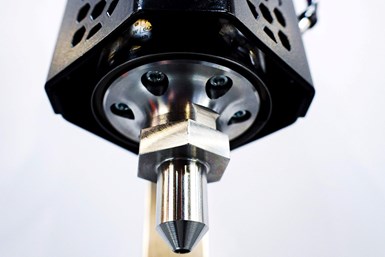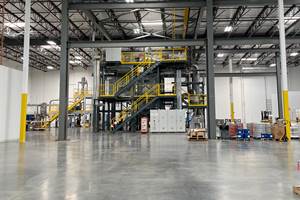Consortium Aims to Bring High-Value 3D Printing to UK
Additive manufacturing experts aim to create accessible, large-format additive manufacturing technology that will make UK manufacturing more competitive and sustainable.
Additive manufacturing (AM) experts in the United Kingdom are working on the EVO One large-format additive manufacturing (LFAM) project to create a 3D printer system that could make UK manufacturers more competitive in the international market. The initiative has received £1.1 million in funding from Innovate UK, the UK’s innovation agency.
Collaborators on the EVO One LFAM project include EVO 3D; the National Manufacturing Institute Scotland (NMIS) operated by the University of Strathclyde and part of the High Value Manufacturing Catapult (HVMC); Rolls-Royce; materials supplier Filamentive; software developer AI Build; and energy technology company Baker Hughes.
The advanced technology being developed by this global consortium of companies and academic institutions could revolutionize the use of industrial AM in the UK, bringing the advanced manufacturing of high-value components for key industries to the country for the first time.
LFAM is a commercial 3D printing technique that creates large-volume polymer components, used in a variety of industries, including aerospace, automotive, energy and marine. While countries like the U.S., Germany and China have embraced this approach, the group says there are currently no manufacturers of large-format 3D printers in the UK. Also, the UK only accounts for around 5% of the global AM market, which the UK government aims to increase to 8% by 2025.
Access to the right technologies will be a crucial part of achieving that aim, but existing LFAM systems have their limitations. These include slow build times, being unsuitable for high-value or high-integrity parts, operational complexity, use of unsustainable materials, and being unaffordable for small- and medium-sized companies.
The new product being developed through Evo One LFAM will address the challenges associated with these systems and cater to the specific needs of the UK Market. The system’s design team is aiming to make it 60% more reliable, achieve a 50% increase in productivity, reduce training and maintenance costs by 30%, and cut material waste by 80%, among a range of other improvements.
On the project’s completion, Evo-3D will launch a spinout business to commercialize the system, called RapidFusion, creating the UK’s first original equipment manufacturer (OEM) in LFAM. Its development would also create the foundation on which a new supply chain can be built, reshore critical manufacturing capabilities, and help more UK manufacturers take advantage of the opportunities presented by Industry 4.0.
“The UK is behind other major economies when it comes to LFAM. What we are aiming to do through the development of this system is democratise high-value, environmentally responsible manufacturing in the UK through a system that will bring the latest technology and capabilities to large and small businesses,” says Jake Hand, director of marketing and development at EVO 3D. ““We saw during the pandemic how easily supply chains can crumble. That’s why it’s potentially more important than it ever has been to develop as much capacity and capability in the UK as we can, not to mention the economic and carbon reduction opportunities associated with having a thriving manufacturing sector at the vanguard of the latest available green technologies.”
The NMIS team will support the project across a number areas, including material analysis, design and the AM process. It will also look at the validation and verification of the system and high-value materials being used. Rolls-Royce and Baker Hughes will test the system once it is ready, while AI Build will help with the development of the slicing technology.
“We have a huge opportunity in the UK to be a leader in large format additive manufacturing. Putting the right technology in as many manufacturers’ hands as we can is a great base to build on, and having a UK-based OEM is the first step in that direction,” says Stephen Fitzpatrick, director – digital factory at NMIS. “With the right tools at our disposal, we can encourage more manufacturers of all sizes to embrace the latest manufacturing techniques and technologies, paving the way for a more sustainable and globally competitive sector.”
Related Content
Video: AM for Harder, Longer-Lasting Brake Discs
Additive manufacturing is being applied to limit automotive brake dust. For a major automaker, Etxetar and Talens are developing a production-speed directed energy deposition system to give brake discs a precise layer of wear-resistant carbide.
Read MoreBMW Group Vehicle to Adopt 3D Printed Center Console
A vehicle coming to market in 2027 will include a center console carrier manufactured through polymer robot-based large-format additive manufacturing (LFAM).
Read MoreMultimodal Powders Bring Uniform Layers, Downstream Benefits for Metal Additive Manufacturing
A blend of particle sizes is the key to Uniformity Labs’ powders for 3D printing. The multimodal materials make greater use of the output from gas atomization while bringing productivity advantages to laser powder bed fusion and, increasingly, binder jetting.
Read MoreCopper, New Metal Printing Processes, Upgrades Based on Software and More from Formnext 2023: AM Radio #46
Formnext 2023 showed that additive manufacturing may be maturing, but it is certainly not stagnant. In this episode, we dive into observations around technology enhancements, new processes and materials, robots, sustainability and more trends from the show.
Read MoreRead Next
Profilometry-Based Indentation Plastometry (PIP) as an Alternative to Standard Tensile Testing
UK-based Plastometrex offers a benchtop testing device utilizing PIP to quickly and easily analyze the yield strength, tensile strength and uniform elongation of samples and even printed parts. The solution is particularly useful for additive manufacturing.
Read MoreAlquist 3D Looks Toward a Carbon-Sequestering Future with 3D Printed Infrastructure
The Colorado startup aims to reduce the carbon footprint of new buildings, homes and city infrastructure with robotic 3D printing and a specialized geopolymer material.
Read MorePostprocessing Steps and Costs for Metal 3D Printing
When your metal part is done 3D printing, you just pull it out of the machine and start using it, right? Not exactly.
Read More


















